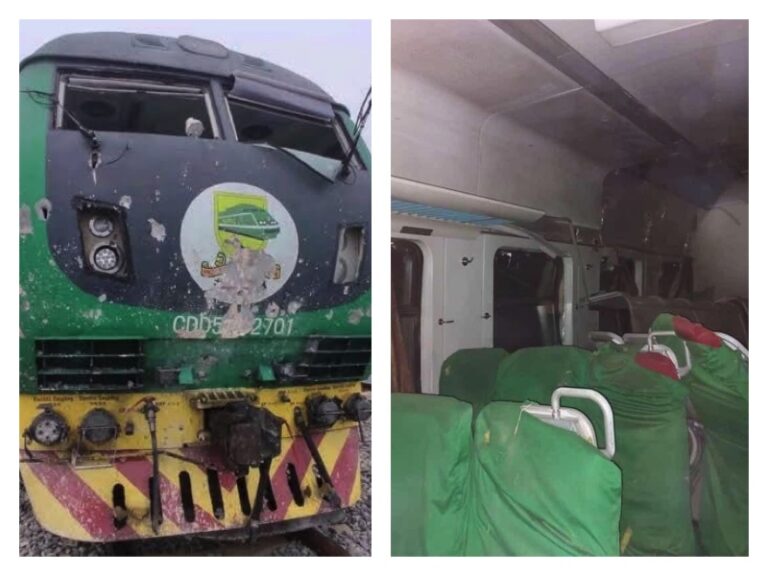News
Reasons For Recurring Train Attacks — Investigation

•…as sector loses passengers, revenue
The increasing train attacks in the country have become not just worrisome but an embarrassment, considering their peculiarity to Nigeria.
Each time the conversation around Nigerian transportation pops up, the railway system seems to have a front row and this could be relatively hinged on President Muhammadu Buhari administration’s decision to improve railway transport in the country.
Aside the many potentials, spawning a massive revenue base and ease of boarding, among others, the stand out in this discussion that is gradually grounding the railway subsector is the multifaceted security challenges upon the passengers and the railway infrastructures.
In recent times, Nigeria has suffered no fewer than four train attacks which respectively place the country at a standstill and led to the shutdown of her train operations for months.
One such was the Abuja-Kaduna train attack of March 28, 2022, that led to the kidnapping of about 168 passengers and the killing of eight others.
The victims were, however, released in batches with the last 23 freed in October.
The train station was built with a $500m loan the government took from the China Exim Bank at a 2.5 per cent annual interest rate. The loan is to be repaid over 20 years with a grace period of seven years.
The project was completed in 2016 by the Chinese Construction Company. Then-Minister of Transportation, Rotimi Amaechi, had said that the Federal Government had paid $150m of the loan.
Again, penultimate week, some passengers waiting to board a train from the Igueben station in Igueben Local Government Area of Edo State to Warri in Delta State were kidnapped by suspected herdsmen.
Confirming this development, a police spokesman, Chidi Nwabuzor, said many of the travellers were also injured.
The statement claimed that the abductors, armed with AK 47, invaded the train station and shot sporadically into the air before abducting scores of intending travellers into the bush.
The Itakpe-Warri train is the only train service for passengers going to the South-East and South-South.
Passengers going to Benin, Warri, Agbor, Asaba, Port Harcourt, Yenagoa and Aba patronise the train service.
The Itakpe-Warri train attack occurred barely 10 months after the Abuja-Kaduna train was attacked.
In February 2022, gunmen invaded the Ajaokuta train station, kidnapped 10 people and killed one person.
Ajaokuta is in Kogi Central.
The attack forced the Nigerian Railway Corporation (NRC), which regulates train services in the country, to suspend Lagos-Ibadan and Ajaokuta train services.
Also, in August last year, the NRC suspended the Lagos-Kano and Ajaokuta train services due to fear of terrorist attacks.
With at least the first three attacks, one would think that the Federal Government with all its budgetary allocations on security and its promises to be more proactive with securing the rail system, the attacks trains should have adequately forestalled.
But, the recent attack on passengers waiting to board a train from the Igueben station projects the level of negligence and unpreparedness of the Federal Government to secure lives and property in the country. Truly, lessons from other attacks have not been adequately learnt hence the lethargic and fire-brigade approach that followed.
It was until the recent attack that the Federal Government decided to collaborate with host communities to ensure that security is facilitated and an intelligence mechanism installed.
The Minister of State for Transportation, Prince Ademola Adegoroye, the day after the attack, decided to pay a visit to the Tom Ikimi train station, also in Igueben Local Government Area of Edo State, where he solicited for the NRC and host communities security committees to be established, as part of efforts to curb the incidence of armed attacks on the nation’s rail infrastructure and passengers.
The Minister said: ‘’The intention of the perpetrators of this heinous crime is to sabotage the great efforts of President Muhammadu Buhari towards the resuscitation of the rail transport service. Henceforth, the government will take proactive measures to forestall train station attacks in the country and ensure the safety of passengers and facilities.”
On his part, NRC Managing Director, Fidet Ohkiria, disclosed that the attacks on the railway system were deliberate, claiming that security cannot be 100 per cent guaranteed.
Speaking to our correspondent, an eyewitness said that the kidnappers that attacked the sub-station at Igueben abducted about 20 passengers and staff struck because the station was not protected by security men.
He said: “The train normally arrives by 5 pm, so at about 20 minutes to 5, the outlaws came through the bush path and invaded the place, taking away the station manager, booking clerk and about 29 passengers made up of males and females.
‘’The DPO, Igueben and his men, the Esan Akatakpa Security network, and the hunters association have been in the forest since last night (Saturday night) doing bush combing. We are hoping that by the end of today, (yesterday), they will be rescued.
“The railway station is in the forest, there is no security, no police, no vigilante and they are at the mercy of God. The station is in Igueben town, just about 1.2 km away from Igueben General Hospital.”
Security surveillance system/revenue
Also, it was not until the attack on the Abuja-Kaduna train that the Federal Government thought it wise to propose in the 2023 Appropriation Bill to spend over N30 billion on the installation of Acoustal Sensing Security surveillance system for the Abuja (IDU)-Kaduna railway.
Rail transport revenue grew year-on-year, YoY, by 42 per cent to N2.93 trillion in the first six months of 2022, January – June, from N2.07 trillion in the corresponding period of 2021.
Data from the National Bureau of Statistics,, NBS, shows that rail transportation data for the second quarter of the year, Q2’22, was N2.93 trillion in revenue in the review period comprising N2.7 trillion generated from passengers, N157.76 million generated from goods and N107.64 million from other income receipts.
However, the data shows that revenue generated from passengers in Q2’22 fell YoY by 44.7 per cent to N598.73 million from N1.08 trillion in Q2’21.
This was as a result of a 25.3 per cent decline in rail transport passengers to 422,393 in Q2’22 from 565,385 passengers in Q2’21, thanks to the incessant attacks on train stations and passengers.
The NBS in the report said: “The rail transportation statistics in Q1’22 revealed that 953,099 passengers travelled via train relative to 424,460 reported in the corresponding quarter of 2021, representing a growth rate of 124.54 per cent.
“In addition, 32,139 tons of goods were transported in the first quarter of 2022, compared to 9,071 tons reported in Q1’21, showing a growth rate of 254.3 per cent.
“In terms of revenue generation, N2.07 billion was received from passengers over the period, higher by 132.82 per cent relative to N892.46 million in Q1’21.
“Similarly, N71.76 million was collected in Q1’22 as revenue from goods/cargos, compared to N18.89 million in Q1’21.
“Other receipts grew by 619.34 per cent in Q1’22, recorded at N57.92 million from N8.05 million in Q1’21.
“In Q2 ’22, passengers declined by 25.29 per cent, reported at 422,393 relatives to passengers in Q2’21 which stood at 565,385.
“Revenue generated from passengers was N598.73 million, a decrease of 44.76 per cent from N1.08 billion in the same period last year.
“More so, revenue generated from goods in Q2 ’22 amounted to N86 million, higher by 14.34 per cent compared to N75.21 million reported in Q22 21.
“Other income receipts stood at N49.72 million, an increase of 988.92 per cent from the N4.56 million recorded in the same period of the preceding year.”
To corroborate these statistics, our correspondent, who visited the IDU train station penultimate Thursday, in Abuja, observed that the influx of passengers into the train station was not as it used to be.
A passenger, who gave his name as Obiora Paul, told SUNDAY VANGUARD, that he was supposed to travel with his family on the Kaduna-bound train, but because of previous incidents, his family took the alternative.
“Train is a good system of transportation and it is a welcome development in Nigeria. My family and I used to be great users of this means of transportation but until that day when the train was attacked, we couldn’t stop imagining that we were part of those that were either kidnapped, brutalised or killed. It was from that day my family decided that they would never use the train again. They now prefer buses or small vehicles from parks. The reason I am boarding this train is that I need to be in Kaduna very soon to set something up before my family comes to join me”, Paul said.
“I believe this anxiety is not just peculiar to my family, particularly my wife, but it is also the same apathy in many households. Yes, the train station has started operation but have they done the needful to secure the train and its station? Now, there is a fresh attack on the same train from Edo. Seriously, the government should not allow this train to fold up. They must do something that is intelligent enough to arrest the situation”, Paul said.
Also, a National Youth Service Corp, NYSC, member, Rahila Mustapha, told our correspondent that her decision to board the train was based on circumstances that on an ordinary day, she wouldn’t make the choice of a train transport because of the recent attack.
She said: “In Nigeria, one of the most porous transportations we have is the train. We have had a series of attacks and yet the government is attending to it as business as usual. The reason I decided to board this train today is that there is something I must pick up in Kaduna today. If not, I won’t accept it because it is a big risk and I am only praying that I keep safe.”
On her part, Adewale Olusola, said: “Most of us were very excited about rail transportation, especially for the comfort and speed it affords. But since the March attack and kidnap of passengers of the Abuja-Kaduna train, I have been very afraid. When I saw the videos of how the hostages were being tortured, it made me even wearier about road and rail transportation as a whole. I’d rather save enough for a flight or remain where I am.”
Security plan
On the recent Edo train station attack, Vanguard had reported that the Inspector-General of Police, Usman Baba, had dispatched police special squads, including the Intelligence Response Team and Anti-Terrorism Squad to Edo State to rescue the victims to complement the efforts of the police in the state.
Also, to fortify the Abuja-Kaduna train station, the Federal Government said that it had introduced a new system of purchasing tickets, which the Minister of Transportation, Mu’azu Sambo, said was the beginning of security checks. He noted that it would enable them to ascertain who boards the train at every point in time.
In the same vein, the Inspector General of Police, Usman Baba, ordered the immediate deployment of armed officials drawn from the police Mobile Force K-9, Force Intelligence Bureau, Explosive Ordnance Unit and the Railway Police Command for the re-commencement of railway services Abuja-Kaduna rail route from Monday, December 5, 2022.
Expert speak
A security and intelligence expert, Dr. Kabiru Adamu, who played host to a television program, said the entire railway system in the country is vulnerable to attacks.
Adamu lamented the absence of security operatives at train stations as well as security gadgets like CCTVs that could help in the investigation an early detection of what transpired.
His words: “Accountability is a major challenge. We have a Minister of Information who promised us that the security level on the railway is adequate and was confident when the Abuja-Kaduna rail service resumed and I’m sure he felt that that applied to all railway infrastructures in the country.
“But unfortunately this incident (Igueben) has shown clearly and has confirmed what we said when he (the minister) made that statement. Earlier on I explained what a good security posture in any location should be, and I can tell you with all sense of responsibility that the entire railway infrastructure, unfortunately, remains vulnerable.”
Adamu further said preventive measures like CCTVs should be installed in all railway stations and states across the country, adding that the attacked station didn’t have any CCTV that would have helped in the case of an attack.
He added that an early warning systems through traditional rulers, communities, market councils and others should be effectively utilised to forestall or even prevent further attacks, as information or intelligence could be shared early to prevent attacks of any kind.
The big question remains: Will the Federal Government continue to approach matters bordering security as if making hay when the sun was out already? The Federal Government must now deploy the same strategy it channeled to Abuja-Kaduna train station to other train stations and substations across the country and this must be done fast. It is high time the Federal Government stopped its fire-brigade approach to security matters.
Source: vanguard: https://www.vanguardngr.com/2023/02/reasons-for-recurring-train-attacks-investigation/
-

 Crime5 days ago
Crime5 days agoVigilante Reportedly Shoots Colleague Dead In Plateau
-

 News3 days ago
News3 days agoRamadan: Osun Cleric Urges Compassion Among Muslims As Asejere Distributes Relief Materials To 537 Beneficiaries
-

 News2 days ago
News2 days agoOkemesi Dies After Slipping Into Coma
-

 Crime3 days ago
Crime3 days agoCourt Commits Man To Life Imprisonment For Kidnapping Judge








